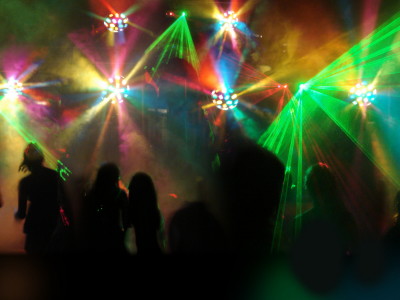Research results show that ``people want to dance when they hear bass''

The bass beat reverberates on the dance floor and at intense music live performances, and the bass gives the impression that 'you can't help but want to move your body and start dancing.' As for that sense of bass and rhythm, researchers at
Undetectable very-low frequency sound increases dancing at a live concert: Current Biology
https://doi.org/10.1016/j.cub.2022.09.035
Bass instinct: low notes really do get people dancing, research finds | Neuroscience | The Guardian
https://www.theguardian.com/science/2022/nov/07/bass-instinct-low-notes-really-do-get-people-dancing-research-finds
Studies have observed that music played on dance floors and electronic dance music (EDM) concerts moved event attendees more when infrasonic sounds were introduced. According to McMaster University neuroscientist Danielle Cameron, 'We were able to demonstrate that low frequencies can actually get people to dance, even though they're so low in frequency that they're not really audible. , It's not something that comes from a conscious awareness that, 'I want to dance when I hear this kind of sound,' it's something beyond consciousness.'
The researchers installed VLF speakers that played very low frequencies at an EDM concert in Canada and had 43 concert attendees who agreed to participate in the study wear motion-capture headbands. rice field. By switching the VLF loudspeaker on and off every 2.5 minutes, we compared the difference in motion with and without low frequency.

As a result, participants were observed to move an average of 11.8% more during the time the low frequencies were flowing. Cameron points out that this means people danced more violently or with more exaggerated movements due to the bass.
In relation to this result, a 2014 study by the McMaster Institute for Music & the Mind , which investigates the influence and effect of music, dance, and art on the nerves at the University of Manchester, found that ``people are more sensitive to changes in high-frequency sounds than to changes in high-frequency sounds. It has been shown that it is easier to notice changes in low-frequency sound. In this way, it is thought that there is a physiological connection between bass and body movements, such as the effect of giving the human body ``nerve entrainment'' to chase the rhythm, such as the bass line.
Why does the human brain love low notes in music? -GIGAZINE

However, Cameron et al.'s research further shows that ``the movement of the body in the bass is not a response to changes in music, but an unconscious level response.'' A questionnaire was also given to the 51 participants of the concert where the VLF speaker experiment was conducted, asking whether they could feel the music with their bodies and whether their physical sensations would affect their movements such as dancing. As a result, many people answered that 'feelings obtained from music affect physical movements.' It is Also, in an experiment to determine whether low-frequency speakers were used in the same concert, participants could not distinguish them on a basis other than chance. From these things, Mr. Cameron concludes that ``low frequencies do not affect physical sensations, but they do affect body movements.''
Ann Keitel, a cognitive neuroscience researcher at the University of Dundee in Scotland, said of the McMaster University study, ``Very low-frequency sounds can have a small effect on the movements of attendees, and the effect can be personal. It seems to be consistent overall rather than things, ”he evaluates the usefulness of the research. At the same time, he says that ``wild research'', which cannot be done in a laboratory, ``observing how an individual moves during an actual concert'' is extremely rare but important. . According to Keitel, as a future research area, he will delve into the point that 'sound unconsciously influences physical activity.' It is hoped that a survey will be conducted to see if it affects public activities.
Related Posts:
in Science, Posted by log1e_dh






